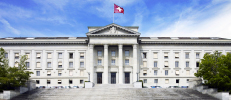Switzerland: Challenging CAS Awards


It has been announced that the two-time US Olympic gymnast, Jordan Chiles, has filed an appeal in the Swiss Federal Supreme Court, the TFS – Tribunal Federal Suisse, to overturn an Award made by the Ad Hoc Division of the Court of Arbitration for Sport (CAS), sitting during the 2024 Paris Olympic Games, that stripped her of her bronze medal in the women’s gymnastics floor event at the Games.
Chiles has asked the TFS to find that the CAS Award was procedurally deficient in two respects:
First, CAS violated Chiles’s fundamental “right to be heard” by refusing to consider the video evidence that showed her inquiry was submitted on time—in direct contradiction to the findings in the CAS Award.
And, secondly, the entire CAS proceeding was unfair, because Chiles was not properly informed that Hamid G. Gharavi, the President of the CAS Ad Hoc Panel at the Games, that revoked Chiles’s bronze medal and awarded it instead to a Romanian gymnast, had a serious conflict of interest, namely, that Gharavi has acted as legal counsel for Romania for almost a decade and was actively representing Romania at the time of the CAS proceeding.
Given these alleged deficiencies in the CAS proceeding, Chiles has asked the TFS to reinstate the score that she claims she rightfully earned at the floor event final and thus the corresponding bronze medal.
This case, once again, raises the likely outcome of these Appeal proceedings.
Although, generally speaking, Arbitration Awards made by CAS, based in Lausanne, Switzerland, are final and binding, it is still possible to challenge them legally before the TFS, which is also based in Lausanne, Switzerland.
However, this is legally possible only in limited circumstances. The rationale for this is to make Arbitration final and binding and, therefore, an effective and popular form of ADR (Alternative Dispute Resolution). In other words, an effective dispute resolution mechanism as an alternative to litigation through the civil courts, which is comparatively a more expensive and lengthy process!
The circumstances in which a CAS Award may be appealed to the TFS are laid down in Article 190(2) of the Swiss Federal Code on Private International Law of 18 December 1987 (the Statute).
A CAS Award can only be challenged before the TFS in the following circumstances:
- if a sole arbitrator was designated irregularly or the arbitral tribunal was constituted irregularly;
- if the arbitral tribunal erroneously held that it had or did not have jurisdiction;
- if the arbitral tribunal ruled on matters beyond the claims submitted to it or failed to rule on one of the claims;
- if the equality of the parties or their right to be heard in an adversarial proceeding was not respected;
- if the award is incompatible with Swiss public policy.
The last ground is rather vague and difficult to establish in practice.
However, in this connection, a brief mention should be made of the landmark decision of the TFS of 27 March 2012, which overturned the CAS Award in the case of Matuzalem Francelino da Silva, a former professional Brazilian footballer, on the ground that a total football ban that had been imposed upon him was contrary to Swiss public policy, in that he was not able to earn his livelihood.
In that case, the TFS, for the very first time in the history of the Statute, annulled the CAS Award for a violation of Swiss public policy, pursuant to the provisions of article 190 (2) (e) of the Statute. See the TFS Decision of 27 March 2012 (4A_558/2011).
This particular ground for legally challenging Arbitral Awards in Switzerland, whether rendered by CAS or other Swiss arbitral bodies, is notoriously difficult to establish, in practice, as ‘public policy’ (‘ordre public’) is a complex and vague concept and one that is restrictively assessed and interpreted in each particular case.
It may be added that the author of this Post, pursuant to the provisions of article 190 (2) (b) of the Statute, was successful in overturning, before the TFS, the CAS Award made in the Schelotto football case, on the ground that the CAS did not have express and clear jurisdiction to deal with the case, which it held was to be decided by the Courts and not by an arbitral body. See the TFS Decision of 22 January 2018 (4A_432/2017).
As mentioned, it is notoriously difficult to successfully challenge legally CAS Awards before the TFS and, in fact, to date, there have only been 13 successful challenges before the TFS!
Will the Chiles TFS Appeal against the CAS Ad Hoc Division Award made during the 2024 Paris Olympic Games add to the tally of successful ones?
We shall see!
The Author may be contacted by e-mail at ‘valloni@valloni.ch’